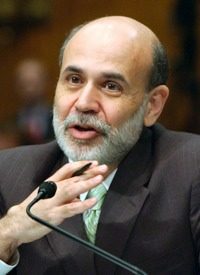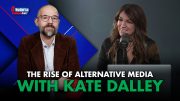
Bernanke acknowledged to Congress that deficit spending is out of control. "One crucial objective is to achieve long-run fiscal sustainability. The federal budget is clearly not on a sustainable path at present," he told members of the House-Senate joint committee. The Fed Chairman termed the work of Congress’ other joint House-Senate "Super-Congress" committee, charged with cutting some $1.5 trillion of the estimated $8-9 trillion in expected deficits over the next 10 years, "a substantial step; however, more will be needed to achieve fiscal sustainability…. In sum, the nation faces difficult and fundamental fiscal choices, which cannot be safely or responsibly postponed."
By those remarks, Bernanke didn’t mean that federal, state, and local governments should balance their budgets and stop using deficit spending to continue their stranglehold on the credit markets. To the contrary, Bernanke’s prescription for the faltering economy is more of the same. Governments must, Bernanke contended, continue deficit spending and hire more people while the Fed tries to re-inflate the housing bubble and loosen credit markets with more "quantitative easing" and interest rate suppression.
Bernanke noted that governments — especially state and local governments, which are shedding jobs and balancing their budgets — need to spend and borrow more in the short term in order to "avoid fiscal actions that could impede the ongoing economic recovery." Bernanke fretted about the "increasing drag being exerted by the government sector. Notably, state and local governments continue to tighten their belts by cutting spending and employment in the face of ongoing budgetary pressures, while the future course of federal fiscal policies remains quite uncertain."
Governments living within their means is a bad thing to followers of the Keynesian school of economics, to which Bernanke adheres. This contrasts with the free market Austrian school, which holds that deficit spending and monetary inflation and interest rate suppression creates economic dislocations, including especially the 2001-2007 housing bubble and its subsequent housing bust.
Bernanke sees lower housing prices as a disaster for the economy, even though consumers can purchase homes for lower prices than they’ve been able to get for years. Bernanke notes that "the housing sector has been a significant driver of recovery from most recessions in the United States since World War II" but that the current economy has left "the rate of new home construction at only about one-third of its average level in recent decades.”
Bernanke noted that he intended to continue to help the mortgage and home ownership market by the "twist" program where the Fed would buy longer-term federal debt on the open market being racked up by the federal government:
The Committee also announced in September that it will begin reinvesting principal payments on its holdings of agency debt and agency mortgage-backed securities in agency mortgage-backed securities rather than in longer-term Treasury securities. By helping to support mortgage markets, this action too should contribute to a stronger economic recovery. The Committee will continue to closely monitor economic developments and is prepared to take further action as appropriate to promote a stronger economic recovery in a context of price stability. Monetary policy can be a powerful tool, but it is not a panacea for the problems currently faced by the U.S. economy.
But Austrian school economists take the opposite view, arguing that more cheap credit leading to federal debt purchases actually hurts the recovery. "From my perspective," Euro-Pacific Capital Chairman Peter Schiff, an Austrian school adherent argued on September 23, "the Twist really amounts to another Fed ‘Hail Mary’ pass that will fall short of the end zone. But, by putting the squeeze on banks and further restricting credit availability to small business the move will likely do more harm than good." Schiff, who accurately predicted the housing bubble, explains: "The policy rests on the false premise moving already historically low interest rates even lower will stimulate the economy into recovery. But low interest rates are part of the problem, not part of the solution."
Photo of Ben Bernanke: AP Images



